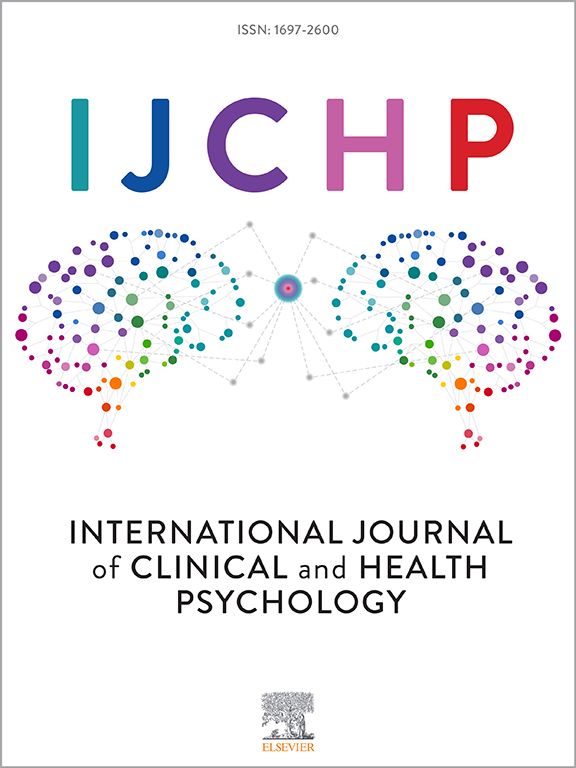正念干预对癌症患者认知障碍的影响:系统回顾和荟萃分析
IF 4.4
1区 心理学
Q1 PSYCHOLOGY, CLINICAL
International Journal of Clinical and Health Psychology
Pub Date : 2025-04-01
DOI:10.1016/j.ijchp.2025.100576
引用次数: 0
摘要
认知障碍在癌症幸存者中被广泛报道,严重影响了他们的生活质量。正念干预越来越多地用于减轻癌症患者的认知障碍。本研究旨在评估正念干预对癌症患者干预后和随访中认知障碍的影响。方法截至2024年2月,检索5个英文数据库(PubMed、Web of Science、Embase、Cochrane、PsycINFO)和3个中文数据库(CNKI、万方、CBM)进行相关研究检索。为了确定效应大小,我们使用随机效应模型计算标准化平均差和95%置信区间。结果纳入23项随机对照试验和7项非随机对照试验。正念干预显著改善了干预后患者的主观认知功能(SMDbetween-group=0.81, 95% CI: 0.58 ~ 1.03;组内smdin =1.12, 95% CI: 0.71 ~ 1.52)和随访时(组间smdin =0.39, 95% CI: 0.09 ~ 0.68;组内smdin =0.59, 95% CI: 0.35 ~ 0.82)。亚组分析表明,发展中国家干预措施的效果显著大于发达国家(pbetween-group=0.014;Pwithin-group =0.008),而没有额外家庭实践的干预措施比有家庭实践的干预措施的组内比较(pbetween-group=0.217;pwithin-group = 0.018)。干预措施持续≥8周与干预措施的效果无显著差异。8周(pbetween-group=0.093;pbetween-group = 0.303)。但对客观认知功能无明显影响。结论正念干预能有效改善癌症患者干预后及随访时的主观认知功能。未来的干预研究应考虑地区、家庭实践和干预时间。本文章由计算机程序翻译,如有差异,请以英文原文为准。
Effects of mindfulness-based interventions on cognitive impairment in patients with cancer: A systematic review and meta-analysis
Background
Cognitive impairment has been widely reported among cancer survivors, significantly impacting their quality of life. Mindfulness interventions are increasingly used to alleviate cognitive impairment in patients with cancer. This study aimed to assess the effects of mindfulness interventions on cognitive impairment in patients with cancer post-intervention and at follow-up.
Methods
Up until February 2024, five English databases (PubMed, Web of Science, Embase, Cochrane, and PsycINFO) and three Chinese databases (CNKI, Wan Fang, and CBM) were searched to identify relevant studies. To determine the effect size, we used random effects model to compute the standardized mean difference and 95 % confidence intervals.
Results
We included 23 randomized controlled trials and seven non-randomized controlled trials. Mindfulness interventions significantly improved patients’ subjective cognitive function post-intervention (SMDbetween-group=0.81, 95 %CI: 0.58 to 1.03; SMDwithin-group=1.12, 95 %CI: 0.71 to 1.52) and at follow-up (SMDbetween-group=0.39, 95 %CI: 0.09 to 0.68; SMDwithin-group=0.59, 95 %CI: 0.35 to 0.82). Subgroup analysis indicated significantly larger effect of the interventions in developing countries than those in developed countries (pbetween-group=0.014; pwithin-group=0.008), and of the interventions without additional home practice than those with home practice in within-group comparisons (pbetween-group=0.217; pwithin-group=0.018). There were no significant differences in the effects between interventions lasting ≥eight weeks and < eight weeks (pbetween-group=0.093; pbetween-group=0.303). However, no significant effects were observed on objective cognitive function.
Conclusions
Mindfulness-based interventions can effectively improve the subjective cognitive function in cancer patients both post-intervention and at follow-up. Future intervention research should take into account regions, home practice, and intervention duration.
求助全文
通过发布文献求助,成功后即可免费获取论文全文。
去求助
来源期刊

International Journal of Clinical and Health Psychology
PSYCHOLOGY, CLINICAL-
CiteScore
10.70
自引率
5.70%
发文量
38
审稿时长
33 days
期刊介绍:
The International Journal of Clinical and Health Psychology is dedicated to publishing manuscripts with a strong emphasis on both basic and applied research, encompassing experimental, clinical, and theoretical contributions that advance the fields of Clinical and Health Psychology. With a focus on four core domains—clinical psychology and psychotherapy, psychopathology, health psychology, and clinical neurosciences—the IJCHP seeks to provide a comprehensive platform for scholarly discourse and innovation. The journal accepts Original Articles (empirical studies) and Review Articles. Manuscripts submitted to IJCHP should be original and not previously published or under consideration elsewhere. All signing authors must unanimously agree on the submitted version of the manuscript. By submitting their work, authors agree to transfer their copyrights to the Journal for the duration of the editorial process.
 求助内容:
求助内容: 应助结果提醒方式:
应助结果提醒方式:


